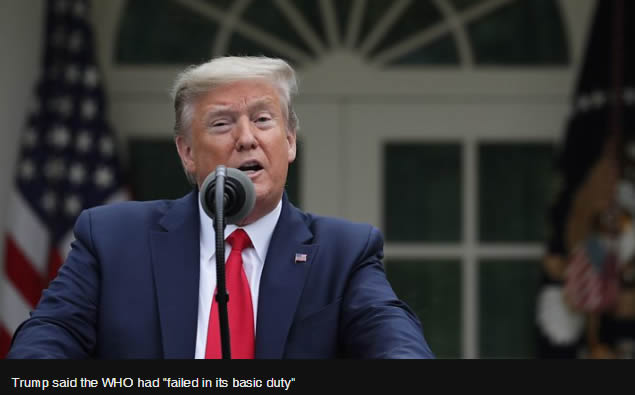
President Donald Trump
US President Donald Trump has said he is going to halt funding to the World Health Organization (WHO) because it has “failed in its basic duty” in its response to the coronavirus outbreak.
He accused the UN agency of mismanaging and covering up the spread of the virus after it emerged in China, and said it must be held accountable.
In response, the UN’s chief said it was “not the time” to cut funds to the WHO.
Mr Trump has been under fire for his own handling of the pandemic.
He has sought to deflect persistent criticism that he acted too slowly to stop the virus’s spread by pointing to his decision in late January to place restrictions on travel from China.
He has accused the WHO of having “criticised” that decision and of being biased towards China more generally.
“I am directing my administration to halt funding while a review is conducted to assess the World Health Organization’s role in severely mismanaging and covering up the spread of the coronavirus,” Mr Trump told a news conference at the White House on Tuesday.
The US is the global health body’s largest single funder and gave it more than $400m in 2019.
A decision on whether the US resumes funding will be made after the review, which Mr Trump said would last 60 to 90 days.
The WHO is yet to directly respond but UN Secretary General António Guterres said the international community should be uniting “in solidarity to stop this virus”.
“It is my belief that the World Health Organization must be supported, as it is absolutely critical to the world’s efforts to win the war against Covid-19,” he said.
Germany’s foreign minister tweeted that strengthening the “under-funded” WHO was one of the best investments that could be made at this time.
The WHO launched an appeal in March for $675m to help fight the coronavirus pandemic and is reported to be planning a fresh appeal for at least $1bn.
Bill Gates, the Microsoft founder and philanthropist, said on Twitter: “Halting funding for the World Health Organization during a world health crisis is as dangerous as it sounds.”
Halting funding for the World Health Organization during a world health crisis is as dangerous as it sounds. Their work is slowing the spread of COVID-19 and if that work is stopped no other organization can replace them. The world needs @WHO now more than ever.
— Bill Gates (@BillGates) April 15, 2020
The Bill and Melinda Gates Foundation is the second-largest funder of the WHO.
What is Donald Trump’s argument?
“With the outbreak of the Covid-19 pandemic, we have deep concerns whether America’s generosity has been put to the best use possible,” the US president said.
The US has by far the highest number of coronavirus cases and deaths worldwide- with more than 600,000 cases and 26,000 deaths.
Mr Trump accused the WHO of having failed to adequately assess the outbreak when it first emerged in the city of Wuhan.
“Had the WHO done its job to get medical experts into China to objectively assess the situation on the ground and to call out China’s lack of transparency, the outbreak could have been contained at its source with very little death,” he told reporters.
“This would have saved thousands of lives and avoided worldwide economic damage. Instead, the WHO willingly took China’s assurances to face value… and defended the actions of the Chinese government.”
Chinese officials initially covered up the outbreak of the virus in Wuhan, and punished whistleblowers who tried to raise the alarm. Beijing later imposed draconian restrictions, including quarantine zones on an unprecedented scale, drawing effusive praise from the WHO and its director-general, Tedros Adhanom Ghebreyesus.
WHO experts were only allowed to visit China and investigate the outbreak on 10 February, by which time the country had more than 40,000 cases.
White House reporters pointed out, however, that Mr Trump himself praised China’s response to the outbreak and downplayed the danger of the virus at home long after the WHO had declared a “public health emergency of international concern”.
Democrats accused him of trying to shift blame away from himself in an election year, but many Republicans in Congress praised his decision.
Why has the WHO faced criticism?
It is not the first time the WHO’s response to the outbreak has come under scrutiny.
On 14 January, the organisation tweeted that preliminary Chinese investigations had found “no clear evidence of human-to-human transmission” of the new virus.
Mr Trump and others have used the tweet to attack the WHO for simply believing China, despite evidence to the contrary. But about a week after that tweet, on 22 January, the agency released a public statement saying that human-to-human transmission did appear to be taking place in Wuhan.
At the end of January, on the same day it declared a public health emergency, the WHO said that travel restrictions were not needed to stop the spread of Covid-19 – advice that was eventually ignored by most countries, including by the Trump administration the next day.
In March, the UN agency was also accused of being unduly influenced by China after a senior official refused to discuss Taiwan’s response to the outbreak.
Meanwhile, some health experts also say that the WHO’s guidance on face masks has led to public confusion.
Other frequently-made criticisms of the WHO more generally are that it is constrained by politics and a sprawling bureaucracy. It came under particular fire for its response to the 2014-2016 Ebola outbreak in West Africa and how long it took to declare a public health emergency, leading the organisation to announce reforms in response.
Source: BBC























